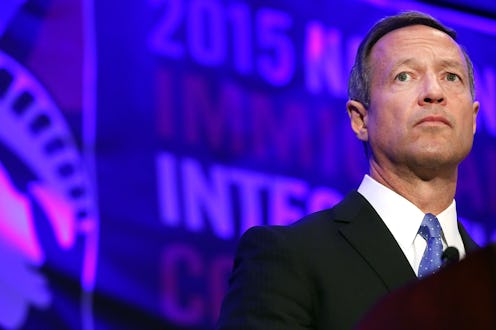News
O'Malley Will Be At The Next Debate, But Why?
Hillary Clinton and Bernie Sanders will face off for the fourth time on Sunday as the Democratic candidates convene for a debate in South Carolina. Sanders' and Clinton's poll numbers have tightened lately, and both have incentive to more aggressively confront one another at this forum. Oh, yeah, and another guy running for president will up on stage, too, despite the fact that he has approximately zero chance of winning the nomination. So, why is Martin O'Malley in the Democratic debate, exactly?
The technical answer is that O'Malley, a former two-term governor of Maryland, will be in the debate because he's cleared the minimum threshold required to be invited to the debate. NBC News, which is hosting the forum, requires candidates to receive an average of 5 percent support in the last five polls, either in Iowa or New Hampshire or nationally, in order to participate. O'Malley's poll average in Iowa currently stands at 5.2 percent, so he's just barely made it past the minimum.
The real mystery, though, is why O'Malley is still in the race at all. He announced his candidacy in May but has been chronically unable to charm voters or build a sizable base of support. Despite participating in every Democratic debate, O'Malley's poll numbers have never cracked 5 percent nationally, and he's never come anywhere within striking distance of either Sanders or Clinton. Frankly, it's difficult to see what he offers that the other two don't.
O'Malley's insistence on continuing his campaign is indeed a head-scratcher. My personal theory has long been that he's running as an insurance policy against a possible Clinton collapse. Basically, he's sticking around as an understudy in case Clinton's campaign unexpectedly implodes. But the surprising strength of Sanders' support means that O'Malley is not the first runner-up for the nomination. If something happens to Clinton, the Socialist senator from Vermont will be the front-runner, and vice-versa. With this dynamic in place, it's very hard to see what O'Malley's path to the nomination looks like.
It would be natural to think that O'Malley, with such desperate odds, would come out swinging against both Clinton and Sanders at the next debate. Yet he's tried that before, and it's ended disastrously. During the last Democratic debate, O'Malley — in an obviously pre-planned comment — criticized the other candidates for "bickering" about something they didn't actually end up bickering about. Later, he somehow managed to unite Sanders and Clinton against him on gun control, a remarkably counterproductive accomplishment given O'Malley's own solidly liberal record on gun laws.
This puts him right back where he started: struggling. While he has gained enough support to make NBC's debate cutoff, it not even clear anymore that this will actually help his campaign. At this point, O'Malley's biggest strength, if you want to call it that, is that he's an effective punching bag for Clinton and Sanders to use in order to avoid attacking one another. Defeatism is rarely a helpful quality for a politician, but now might be the time for O'Malley to admit defeat and start lobbying Clinton for a cabinet post in her administration.
